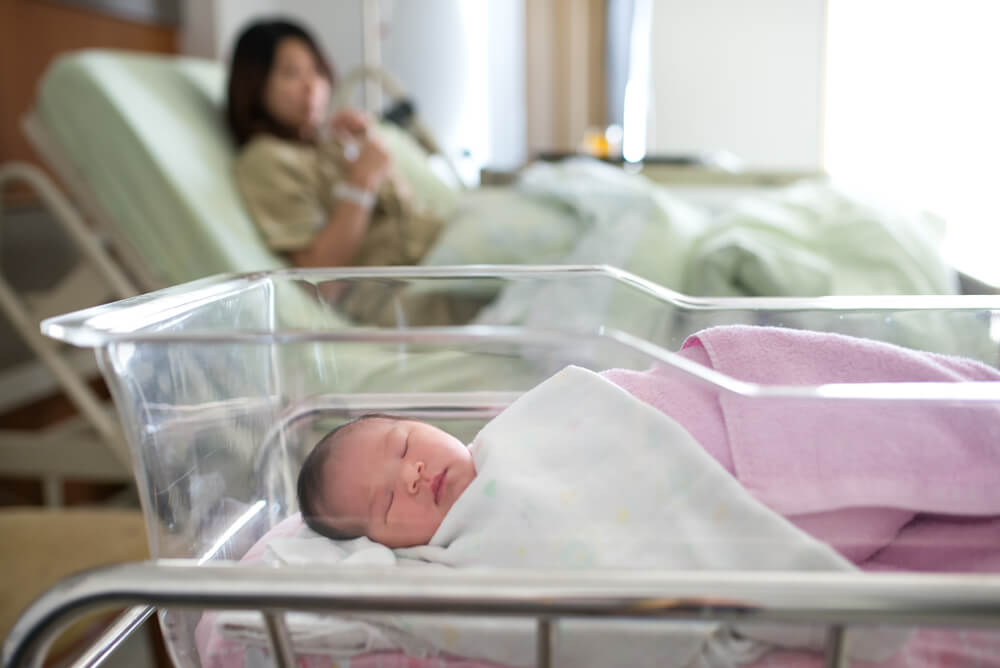
Newborn – Hospital Care
Although most newborns are healthy babies and are discharged 24 to 72 hours after birth, there are times a newborn may require a little more time in the hospital. Dr. Ward provides hospital care for babies that are born prematurely or have other health concerns like jaundice, heart malformations and digestive difficulties that need to be monitored.
Baby’s First Physical Exam
After a baby is born, Dr. Ward typically performs the first physical exam with 24 hours of the birth. During baby’s first physical exam, Dr. Ward will check the newborn’s:
- Skin
- Head & Neck (Including Eyes & Ears)
- Breathing & Heartbeat
- Urinary & Stool Function
- Abdomen & Genitals
- Nervous System
- Muscles & Bones
If needed, Dr. Ward may also order blood, oxygen level and/or hearing tests. The purpose of the newborn examination is to see how well the baby is transitioning to their new environment outside the mother’s womb.
Short Term Hospital Stay

When babies are born with health conditions of concern such as jaundice, heart malformations and digestive difficulties, the baby may require a short term stay in the hospital so their condition can be monitored. Dr. Ward will work with the hospital staff to care for the newborn.
Jaundice
Jaundice is a common condition that causes a yellow discoloration in the newborn’s skin and eyes. The condition and discoloration is caused because the baby’s liver isn’t mature enough to get rid bilirubin, a yellow colored pigment of red blood cells. The typical treatment for jaundice is light therapy, called phototherapy, but in certain situations other treatments may be necessary. Dr. Ward will monitor the baby’s progress and after release from the hospital, he will schedule a follow-up visit within a few days. The condition typically normalizes within 3 weeks of birth.
Heart Malformations
Heart malformations in babies at the time of birth are called congenital heart defects. While it can be shocking for parents to hear that their baby has a congenital heart defect, it is a fairly common happening to 1 in 100 babies born in the United States. Fortunately, many heart defects don’t require treatment or can be easily treated. As the primary care doctor, Dr. Ward will work with cardiologists and other hospital staff to make sure the baby’s heart is stable before discharge and frequent follow-up visits will be conducted after discharge.
Digestive Difficulties
Nutrition for a newborn is very important for a newborn. After receiving intrauterine nutrition from the mother, the baby’s feeding and digestion transition begins after birth. It is common for newborns to struggle with this transition for the first few days but they will typically adjust to feeding and normal digestion without special treatment. Many times the transition is more of an adjustment of how the baby is fed that makes the difference.
In some cases where feeding intolerance, spitting up or even vomiting may require a little longer stay in the hospital for evaluation. While rare, there are some digestive abnormalities that can be life threatening. Dr. Ward, along with the hospital staff, will evaluate the newborn’s feeding and digestive progress to determine if discharge or an extended stay is necessary.
Other Concerns
While jaundice, heart defects and digestive problems are the most common reasons for a short term hospital stay, there may be other concerns based on the baby’s first physical that Dr. Ward may want to monitor under hospital care for the well-being of the newborn.
Extended Hospital Stay

There are some instances when an extended hospital stay may be necessary for the life and long-term health of a baby. These situations are more rare than common but will require hospital care. As a family doctor and primary care physician, Dr. Ward will monitor and provide requisite evaluations and treatments for the baby along with hospital staff and specialists.
Premature Birth
When a birth takes place less than 37 weeks of gestation, the birth is considered premature. Unfortunately, premature babies have higher mortality rates and are susceptible to other health concerns and developmental delays. Babies born prematurely need to be monitored under hospital care until the baby’s physical development has matured enough to live without life sustaining care. Dr. Ward works with the hospital staff as the primary care physician to supervise the healthcare for babies who are born premature.
Critical Congenital Heart Disease
Critical Congenital Heart Disease, known as CCHD, can cause serious health problems or death. Unlike the heart diseases describe above, CCHD requires surgery, catheter procedures or a combination of both. Medication may also be administered in specific situations. In these cases, Dr. Ward works in conjunction to pediatric heart surgeons to treat the newborn. After surgery, Dr. Ward will provide on-going examinations and subsequent treatments as necessary.
For more information about congenital heart disease, visit: http://www.marchofdimes.org/complications/congenital-heart-defects.aspx
Digestive System Abnormalities
As explained above, there are some rare but possible digestive abnormalities that are more serious and typically require surgery to correct. These abnormalities may affect the baby’s:
- esophagus
- stomach
- intestines
- liver
- gall bladder
- abdominal wall
- anus & rectum
As these digestive diseases are identified, Dr. Ward works with the hospital staff and surgical specialists to care for the newborn. Post-surgical care and on-going examinations will be conducted by Dr. Ward as the baby grows and developed.
Summary
As a primary care physician, Dr. Ward provides hospital care for newborn babies. From the first physical to post-surgical care for uncommon abnormalities, Dr. Ward will know the complete health history of an individual from birth. As the newborn grows to toddler, teenager and beyond, Dr. Ward will personally know the health history of the individual from the very beginning!
